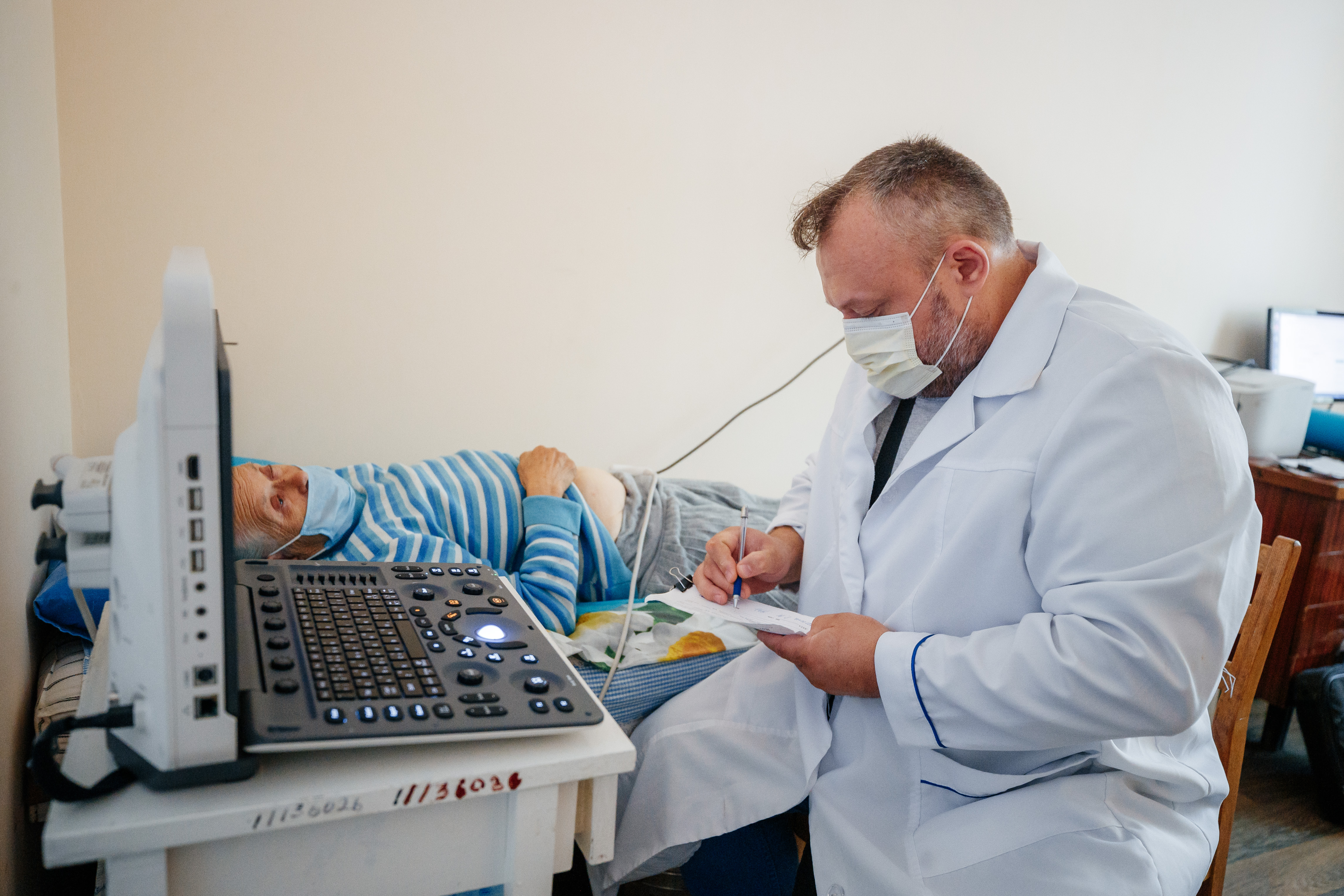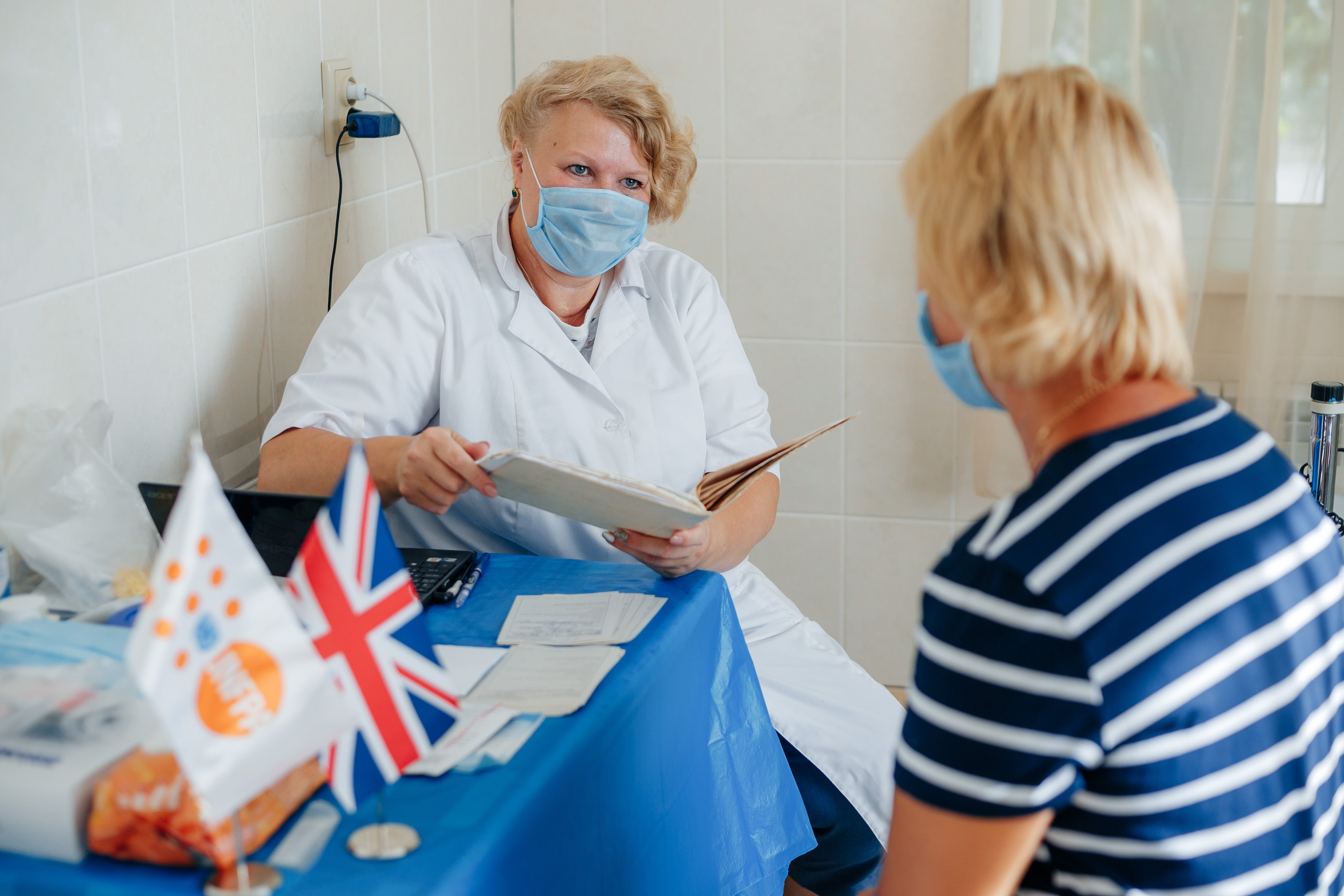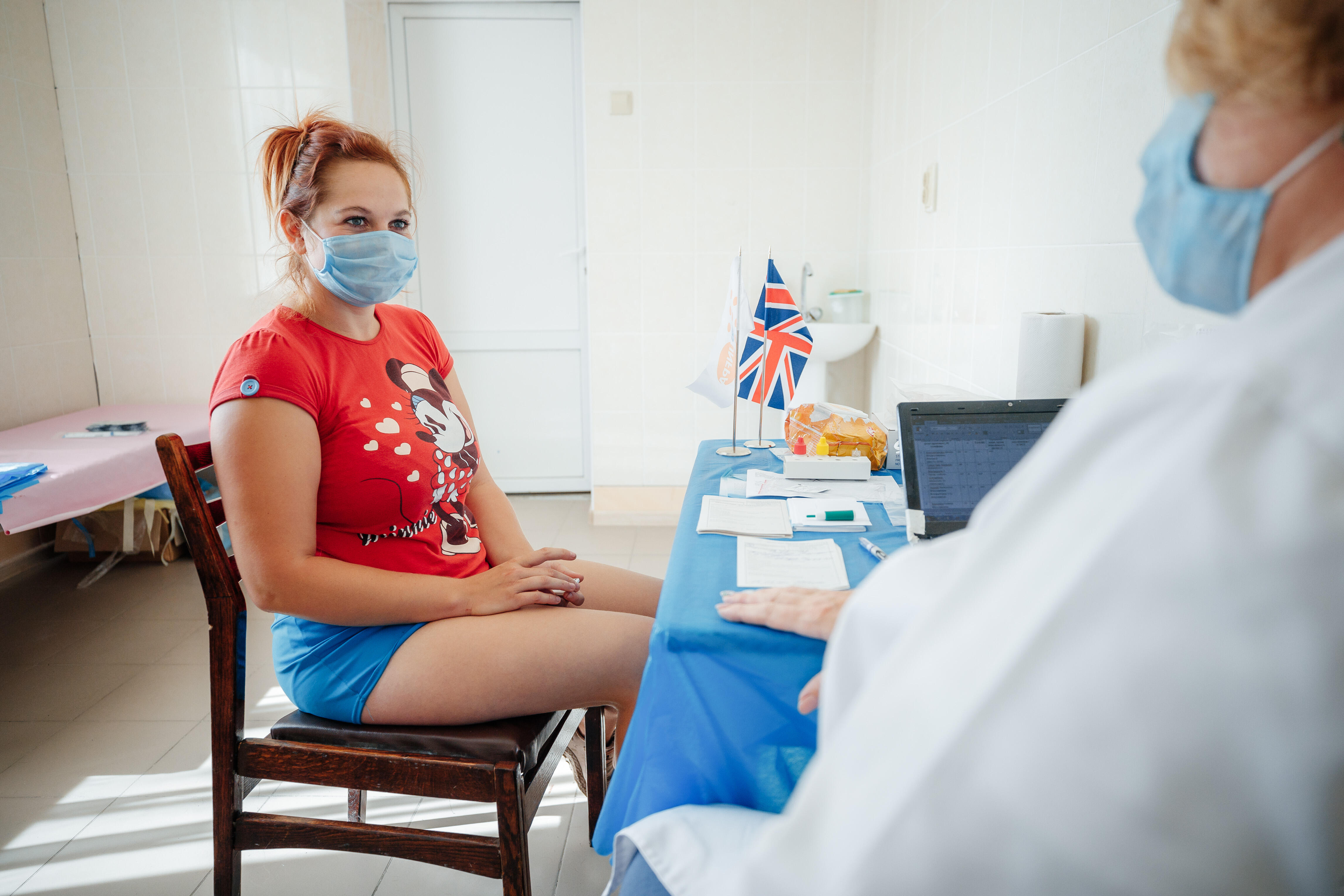“If only it was not an oncology disease”, thought Valentina, a retiree, entering the gynecologist's office at UNFPA mobile clinic in Ukraine a year ago. Before then, she had not attended a medical examination for a long time, but lately she has been suffering from specific pains. The specialist diagnosed in time precancerous disease of pelvic organs and prevented serious consequences. The woman is 71 years old. She is one of the few people living in Komyshuvakha village, Popasna district, Luhansk oblast. Medical services are being provided to the villagers by a rural health post staffed by a family doctor and nurses. In case of problems requiring the attention of subject matter specialists, patients are referred to the district clinic in Popasna city. Despite the fact that the distance is only 10 km from the village, not everyone can make it to the doctor’s office. According to local specialists, the main obstacles are financial problems and the health condition of patients. Valentina says that this path is extremely difficult for her due to her very poor eyesight. Therefore, when she learned that the specialists of the mobile clinic would return to her village in the summer of 2020, she was among the first clients waiting in line.
“I am very pleased! The doctor checked my current condition, prescribed maintenance treatment medication, vitamins, and an ointment. My diagnosis is related to my age, there is no help for it, but it is necessary to maintain and observe my condition”, Valentina says.
Apart from the woman, about 60 persons came to the mobile clinic in Komyshuvakha for this year's medical examination. In total, 877 patients have been consulted since this model was first applied in Popasna district. Each mobile clinic is staffed with a family doctor, a gynecologist, a social worker, a nurse, and a driver. The gynecologist conducts a complete examination of the woman, cytological examination, checks the condition of the mammary glands and genitals. The family doctor performs ultrasonography of the pelvic organs, kidneys, liver, pancreas, mammary glands and thyroid gland, and prostatic gland. Mobile clinics work according to a clear schedule and let local doctors know in advance about their arrival, and the doctors then inform the patients. Due to the fact that the team is provided with its own transport, it delivers medical services even to hard-to-reach settlements located near the contact line.

“Chronicity” of the gray area
According to Igor Ieriomin, a family doctor at the mobile clinic, specialists often come across advanced cases of diseases in the settlements located in the gray area.
“During one and a half months of work, we found 4 cases of gynecological oncology disease and a liver cancer. Even being aware of the diagnosis, people very often do not go to oncology centers because they believe that they live in a dangerous area where their lives could be ended at any moment by a random bullet”, says the specialist.
Ievghenia Kyslytsia, a gynecologist at the clinic, also recalls a case when an elderly woman living in a village located near the contact line, was diagnosed with advanced uterine cancer.
“The ultrasonography confirmed my fears. Moreover, oncology disease with perianal fistula… She suffered from pain for a year but did not see the doctor because she couldn't afford to pay for a car to take her to a hospital. 400 hryvnias turned out to be an unaffordable amount for her. And we can see many such cases. Unfortunately, the war has caused a great deal of stress to the population as well as significant economic difficulties; therefore, over the past 6 years, the number of cancers and cases of diabetes mellitus has increased’, says the specialist.
Although most of the mobile clinic’s clients are elderly people with chronic problems, they are not the only ones who are diagnosed with cancer by specialists. According to Kyslytsia, cervical carcinoma has greatly “rejuvenated”. The gynecologist attributes this to the lack of a culture of vaccination against human papilloma virus in Ukraine and lack of knowledge about sex education among young people.
“We have already diagnosed two such cases this year: clients born in 1996. It is good that it was done at the early stages. That is why it is so important to visit the gynecologist at least once a year, and, preferably, to be vaccinated against HPV. Because the 16th and 18th strains of the virus are the cause of cervical carcinoma in 90% of cases”, says the doctor.
According to her, in addition to the above reasons, people still have a psychological barrier associated with visiting the gynecologist as well as a low level of awareness of how important it is to get scheduled consultations. She says that when she came to some settlements, she saw people who had not visited specialists for 6 to 8 years.
Airway diseases
According to UNFPA Ukraine statistics, airway diseases are some of the most common pathologies diagnosed in Luhansk oblast. The family doctor Ieriomin attributes this to the industrial character of Donbas region.
“Most people work here in the mineral resource industry that is to say in mines. This means they work in high dust level conditions and, therefore, the resistance to viruses and infections is lower. It results further in chronic lung, bronchial diseases such as pneumoconiosis (dust diseases). Of course, it also affects a person's lifestyle: the risk is lower if you do not abuse alcohol and care for the health”, says the doctor.
According to Ieriomin, pathologies of the liver, pancreas gland, and gallbladder are largely caused by bad eating habits and alcohol abuse.
In addition, due to poor quality drinking water in the region, kidney problems are widespread, especially renal calculus.

Attention to inclusivity
If patients are unable to come to the mobile clinic on their own, then, on request, a team of specialists goes to their home. Yet, the day before, the team clarifies whether the client has a fever and signs of respiratory diseases. Doctors armed with disinfectants, protective masks and overalls go to the patient.
“So far, we have been asked only once to visit at home a post-stroke patient who was semi-paralyzed. All medical equipment of the clinic, that is, an ultrasonography apparatus, an electrocardiograph, etc. are transportable. That is why we did an electrocardiogram on the spot, examined all the organs using an ultrasonograph. It is very important that patients with such problems know that medicine has not forgotten about them and they have the right to quality care. This gives hope for recovery and alleviates a person's condition”, says doctor Ieriomin.
Every week, the mobile clinic makes an average of 4 visits to the settlements of the district, and it works 2 days in Popasna. Both specialists say that such a busy schedule is exhausting, but they understand the need for the UNFPA model.
“Last year, when I first visited the oblast villages and settlements located along the contact line as part of the UNFPA clinic team, I saw these old ladies who had not been examined by a doctor for several years. Then I realized that this model is vital. It is so good that we have a car and we are able to deliver services to those who cannot get to a hospital due to some circumstances. It's very inspiring when we succeed in helping prevent a serious diagnosis. You feel both glad and proud. People are happy, we receive hundreds of positive comments and thanks”, says gynecologist Kyslytsia.
Ieriomin agrees that such an initiative makes sense and is relevant: “The demand undoubtedly exists. The length of Popasna district is 70 km. You see how remote some villages are. Those people are my compatriots. Currently, there are no such intense hostilities as back in 2015. There may be some random bullet, but it can happen anywhere. Therefore, as for me, this risk is quite justified”.
Since July 2020, mobile clinics’ activities have been launched in Luhansk and Donetsk oblasts within the framework of the UNFPA (United Nations Population Fund) program with the support of the UK government. They provide access to highly specialized medical and psychosocial services for people living in settlements along the contact line and/or hard-to-reach isolated settlements in Eastern Ukraine, namely in Bakhmut, Yasynuvata districts, and Avdiyivka city in Donetsk oblast and Stanytsia Luhanska, Novoaydar and Popasna districts in Luhansk oblast. Mobile clinics carry out examinations, provide critical medical services, and uncover hidden cases of domestic and gender-based violence.


